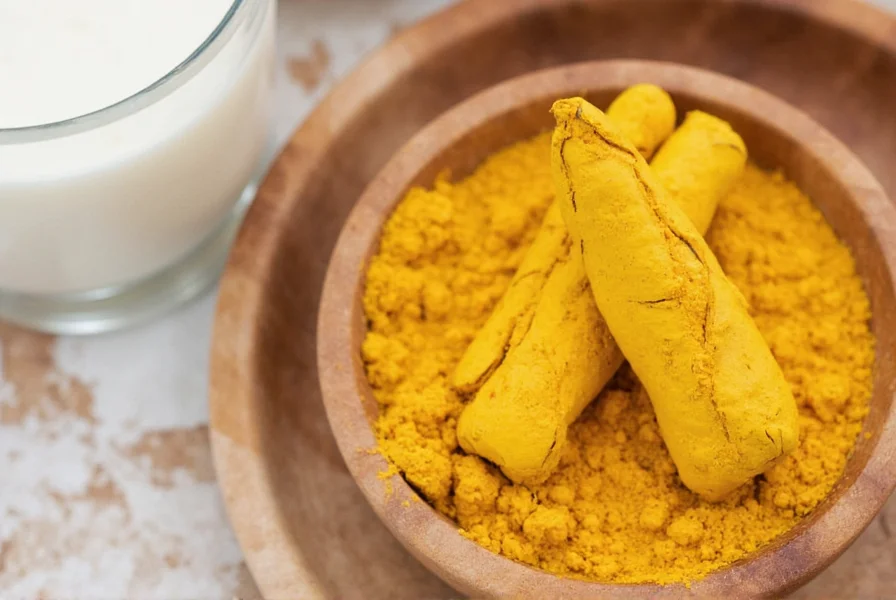Golden milk, a traditional Ayurvedic beverage combining turmeric with milk, has gained popularity in Western wellness circles for its potential health properties. This warm, comforting drink blends ancient wisdom with modern scientific interest, particularly regarding inflammation management and overall wellness support.
The Science Behind Turmeric's Active Compound
Curcumin constitutes about 2-8% of turmeric root and represents its most studied bioactive component. This polyphenol gives turmeric its distinctive yellow color and is responsible for most of its potential health benefits. However, curcumin faces a significant challenge: poor bioavailability when consumed alone. It's poorly absorbed through the digestive tract, rapidly metabolized, and quickly eliminated from the body.
When combined with milk, particularly whole milk containing fats, curcumin's bioavailability improves substantially. Fat-soluble compounds like curcumin require dietary fats for optimal absorption. The traditional preparation often includes black pepper (containing piperine), which can increase curcumin absorption by up to 2,000% according to some studies.

Evidence-Based Health Benefits of Turmeric Milk
Research on turmeric benefits with milk reveals several potential health advantages, though it's crucial to distinguish between concentrated curcumin supplements used in studies and dietary consumption:
| Benefit Category | Scientific Evidence | Realistic Expectations |
|---|---|---|
| Anti-inflammatory Effects | Multiple studies show curcumin reduces inflammatory markers like CRP and IL-6 | Dietary amounts may provide mild support, not replacement for medical treatment |
| Antioxidant Properties | Curcumin neutralizes free radicals and may boost the body's antioxidant enzymes | Contributes to overall antioxidant intake but not a magic solution |
| Joint Health Support | Some clinical trials show improvement in osteoarthritis symptoms with curcumin supplements | Regular consumption may offer mild relief but won't reverse joint damage |
| Sleep and Relaxation | Limited direct evidence, but warm milk and anti-inflammatory effects may promote relaxation | Primarily anecdotal; likely works through ritual and warmth rather than specific compounds |
Why Milk Enhances Turmeric's Benefits
The combination of turmeric with milk isn't merely traditional—it has scientific merit. Curcumin is fat-soluble, meaning it dissolves in fats rather than water. When consumed with milk (especially whole dairy or full-fat plant-based alternatives), the fat content significantly improves curcumin's absorption.
Research published in the journal Advances in Experimental Medicine and Biology confirms that consuming curcumin with fats can increase its bioavailability by up to 7-8 times compared to consuming it alone. This explains why traditional preparations of turmeric milk often use whole milk or add healthy fats like coconut oil.
Preparing Effective Turmeric Milk
Creating turmeric milk that maximizes potential benefits requires attention to preparation details. Here's an evidence-informed recipe:
- 1 cup (240ml) of whole milk or full-fat plant-based milk (coconut, almond, or oat)
- 1/2 teaspoon turmeric powder (or 1 inch fresh turmeric root, grated)
- 1/4 teaspoon black pepper (essential for piperine content)
- Optional: 1/4 teaspoon cinnamon, small piece of fresh ginger, or 1 teaspoon honey
Combine ingredients in a small saucepan. Heat gently over medium-low heat for 5-10 minutes (do not boil). Whisk thoroughly to ensure turmeric doesn't settle. Strain if using fresh ingredients. The gentle heating helps release curcumin while preserving its integrity.
Recommended Usage and Timing
For those interested in turmeric benefits with milk for inflammation support, consistency matters more than single large doses. Research suggests:
- Consuming turmeric milk once daily provides more consistent benefits than occasional large servings
- Evening consumption may support relaxation and sleep quality for some individuals
- The optimal timing appears to be with or after meals to enhance absorption
- Allow at least 4-6 weeks of regular consumption to assess potential benefits
Important Considerations and Precautions
While turmeric milk is generally safe for most people, certain precautions are necessary:
- Individuals taking blood thinners should consult their physician, as turmeric may enhance anticoagulant effects
- Those with gallbladder issues should exercise caution, as turmeric may stimulate bile production
- Pregnant women should limit consumption to culinary amounts rather than therapeutic doses
- Excessive consumption (more than 1-2 teaspoons of turmeric daily) may cause digestive discomfort
Understanding Research Limitations
When exploring turmeric milk health benefits scientific evidence, it's crucial to recognize that most clinical studies use highly concentrated curcumin supplements (typically 500-2,000 mg daily), not the smaller amounts found in dietary preparations. A typical cup of turmeric milk contains approximately 200-500 mg of curcumin, significantly less than research doses.
A comprehensive review in Nutrients journal noted that while curcumin shows promise for various health conditions, "the clinical efficacy of dietary turmeric remains limited by its poor bioavailability." This explains why many people don't experience dramatic results from occasional turmeric milk consumption.

Realistic Expectations for Turmeric Milk
Golden milk should be viewed as a complementary wellness practice rather than a standalone treatment. Its potential benefits work best as part of an overall healthy lifestyle that includes balanced nutrition, regular exercise, and adequate sleep.
Those seeking turmeric with milk for joint pain relief should understand that while some find mild symptomatic relief, it won't replace medical treatments for significant joint conditions. Similarly, while turmeric milk may contribute to reduced inflammation markers, it's one component of a broader anti-inflammatory lifestyle approach.
Conclusion
Turmeric mixed with milk offers a traditional, potentially beneficial beverage with scientific backing for certain health properties. The fat content in milk enhances curcumin absorption, making this combination more effective than turmeric alone. While not a miracle cure, regular consumption as part of a healthy lifestyle may provide modest anti-inflammatory and antioxidant benefits.
As with any natural remedy, maintaining realistic expectations is crucial. Turmeric milk works best as a complementary practice rather than a primary treatment for medical conditions. Those with specific health concerns should consult healthcare professionals before relying on dietary approaches alone.
What is the best type of milk to use for turmeric benefits?
Whole dairy milk or full-fat plant-based alternatives like coconut milk provide the best results for turmeric benefits with milk. The fat content significantly enhances curcumin absorption. Research shows that consuming curcumin with fats can increase its bioavailability by up to 7-8 times compared to water-based preparations. Avoid skim or low-fat milk options if maximizing absorption is your goal.
How much turmeric should I use in golden milk for health benefits?
For a standard serving of turmeric milk, use 1/2 to 1 teaspoon of turmeric powder per cup of milk. This provides approximately 1-2 grams of turmeric, containing about 20-40 mg of curcumin. While clinical studies often use higher doses (500-2,000 mg of curcumin), dietary amounts still offer benefits when consumed consistently. Remember to include a pinch of black pepper to enhance absorption.
Can turmeric milk help with arthritis pain?
Some research suggests turmeric milk may provide mild relief for arthritis symptoms due to curcumin's anti-inflammatory properties. A study in the Journal of Medicinal Food found that 500 mg of curcumin twice daily significantly improved pain and function in people with knee osteoarthritis. However, the amount of curcumin in a typical cup of turmeric milk is much lower, so effects would be more subtle and require consistent, long-term consumption rather than immediate pain relief.
How long does it take to experience benefits from turmeric milk?
Most people need to consume turmeric milk consistently for 4-8 weeks before noticing potential benefits. Curcumin works cumulatively rather than providing immediate effects. Research on curcumin supplementation typically shows measurable changes in inflammatory markers after 4-12 weeks of regular use. Individual responses vary based on metabolism, health status, and consistency of consumption.
Are there any side effects of drinking turmeric milk daily?
When consumed in culinary amounts (1-2 cups daily with 1/2-1 teaspoon turmeric), turmeric milk is generally safe for most people. However, excessive consumption may cause digestive issues like nausea or diarrhea. Those taking blood thinners should consult their doctor, as turmeric may enhance anticoagulant effects. People with gallbladder problems should also exercise caution, as turmeric may stimulate bile production. Always start with small amounts to assess tolerance.











 浙公网安备
33010002000092号
浙公网安备
33010002000092号 浙B2-20120091-4
浙B2-20120091-4